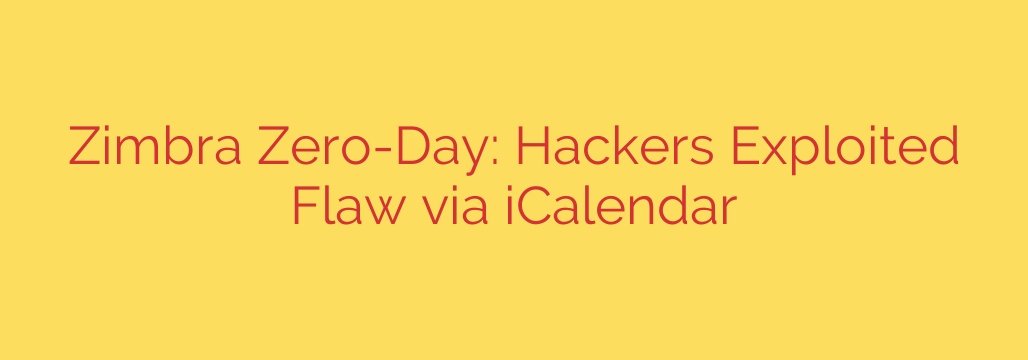
Urgent Security Alert: Critical Zimbra Zero-Day Flaw Actively Exploited
A critical zero-day vulnerability has been discovered in the Zimbra Collaboration Suite (ZCS), and it is being actively exploited by threat actors. This security flaw allows attackers to steal sensitive information and potentially gain full access to user email accounts through a cleverly disguised attack vector: a malicious calendar invitation.
If your organization uses the Zimbra email and collaboration platform, immediate action is required to prevent a security breach.
Understanding the Vulnerability: CVE-2024-29805
The vulnerability, tracked as CVE-2024-29805, is a persistent Cross-Site Scripting (XSS) issue within the calendar appointment feature of Zimbra. In simple terms, this flaw allows an attacker to embed and execute malicious code directly within the web interface of a user’s email client.
The attack is particularly dangerous because it doesn’t require the user to click a suspicious link or download a malicious file. The code can be triggered simply by interacting with the malicious calendar event in a seemingly harmless way.
How the iCalendar Attack Works
The attack chain is both simple and effective, making it a significant threat to unpatched systems. Here is a step-by-step breakdown of how hackers are exploiting this flaw:
- Malicious Email Delivery: The attacker sends a carefully crafted email to a target using a Zimbra email account.
- Embedded iCalendar Appointment: This email contains a malicious iCalendar appointment. Embedded within the details of this appointment is a malicious script.
- User Interaction: When the recipient views the calendar invitation, the malicious script is loaded into the interface. The script is often designed to execute when the user simply hovers their mouse over a specially crafted link within the appointment details.
- Session Token Theft: Once triggered, the script silently steals the user’s active session tokens or “cookies.” These tokens are what keep a user logged into their account without needing to re-enter their password.
- Account Hijacking: With the stolen session tokens, the attacker can impersonate the user, gaining full, unauthorized access to their email account. From there, they can read, send, and delete emails, steal confidential data, and launch further attacks against the organization.
The primary danger of this XSS vulnerability is that it allows for complete session hijacking, bypassing the need for passwords or multi-factor authentication once the initial exploit is successful.
Who Is at Risk?
This vulnerability affects multiple versions of the Zimbra Collaboration Suite. Any organization running an unpatched version is exposed. The exploit is known to impact at least the following versions, and it is highly recommended that all administrators review their systems:
- Zimbra Collaboration Suite versions before 8.8.15 Patch 46
- Zimbra Collaboration Suite versions before 9.0.0 Patch 39
Given that this is a zero-day flaw that was exploited before a patch was available, it is crucial to assume your system may have been targeted if it was not up to date.
Actionable Steps to Secure Your Zimbra Server
Protecting your organization from this threat requires immediate and decisive action. Follow these security recommendations to mitigate the risk.
- Apply Security Patches Immediately: The most critical step is to update your Zimbra instance to the latest patched version. Zimbra has released official patches (8.8.15 Patch 46 and 9.0.0 Patch 39) that specifically address CVE-2024-29805. Do not delay this process.
- Sanitize HTML Input: As a temporary mitigation measure if patching is not immediately possible, administrators can manually sanitize HTML content within calendar items to strip out potentially malicious scripts. However, this should only be considered a short-term fix until a full patch can be applied.
- Monitor for Suspicious Activity: Review server logs for any unusual login patterns, session activity from unfamiliar IP addresses, or the creation of strange forwarding rules on user accounts. These could be indicators of a successful compromise.
- Educate Your Users: Remind employees to be cautious of unexpected or unsolicited calendar invitations, especially from unknown senders. While this specific attack can be difficult to spot, fostering a culture of security awareness is a vital layer of defense.
- Implement a Web Application Firewall (WAF): A properly configured WAF can help detect and block common XSS attacks, providing an additional layer of protection against this and future web-based vulnerabilities.
The exploitation of this Zimbra zero-day highlights the persistent threat of XSS attacks and the need for constant vigilance. By taking swift action to patch systems and reinforce security protocols, organizations can protect themselves from this dangerous email account hijacking threat.
Source: https://www.bleepingcomputer.com/news/security/hackers-exploited-zimbra-flaw-as-zero-day-using-icalendar-files/







